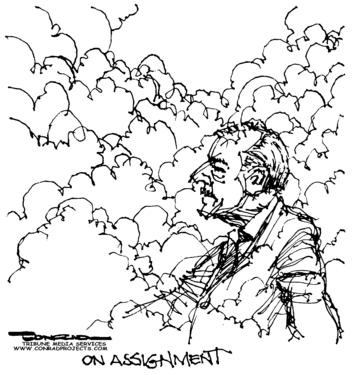- MENU
- HOME
- SEARCH
- WORLD
- MAIN
- AFRICA
- ASIA
- BALKANS
- EUROPE
- LATIN AMERICA
- MIDDLE EAST
- United Kingdom
- United States
- Argentina
- Australia
- Austria
- Benelux
- Brazil
- Canada
- China
- France
- Germany
- Greece
- Hungary
- India
- Indonesia
- Ireland
- Israel
- Italy
- Japan
- Korea
- Mexico
- New Zealand
- Pakistan
- Philippines
- Poland
- Russia
- South Africa
- Spain
- Taiwan
- Turkey
- USA
- BUSINESS
- WEALTH
- STOCKS
- TECH
- HEALTH
- LIFESTYLE
- ENTERTAINMENT
- SPORTS
- RSS
- iHaveNet.com

Walter Cronkite died Friday at the age of 92, but the kind of journalism he represented -- tough, spare, serious -- has been on the wane since he left the anchor's chair.
As anchor of "The CBS Evening News," Cronkite was often referred to as "the most trusted man in America."
When he spoke out against the Vietnam War on the air, President Lyndon Johnson famously remarked, "If I've lost Cronkite, I've lost Middle America."
The networks evening newscasts in those days were appointment television, their anchors -- and Cronkite most of all -- deeply respected figures on the American landscape.
Today, the leading news anchors have been seriously diminished -- not just by the thudding drumbeat of "liberal bias" charges, though that's a factor, but by the excess in which they co-exist.
Brian Williams, Katie Couric and Charles Gibson still preside over nightly broadcasts that resemble the template Cronkite used, but they are a shadow of what they once represented in terms of journalistic ambition. It's hard to imagine, for instance, Cronkite jetting out to Los Angeles to preside over CBS' wall-to-wall coverage of Michael Jackson's memorial, as Couric recently did.
Cronkite operated in a different era, but as Fox News' Brit Hume noted, his style reflected a certain modesty that appears to have been largely lost in television news. The most bombastic voices, not surprisingly, frequently garner the most attention today.
"The seepage of opinion into journalism slowly broke his heart over the years," NBC anchor Brian Williams said on MSNBC.
Dan Rather -- who replaced Cronkite at CBS -- also noted on MSNBC that Cronkite was "an extremely strong ad-libber," and "had that ability to get through the glass ... to connect with people."
Rather added that Cronkite was a reporter first and fiercely protective of correspondents and producers -- a mindset that permeated the news division during his tenure.
Cronkite "really became a model for what anchoring an evening newscast would be," Gibson said in an interview with CNN, adding that his wire-service background was invaluable in shaping the way Cronkite approached presenting the news. Gibson conceded that TV news is a balance between what people want to know and what they need to know, "because it's a business, and you need ratings."
Cronkite fell squarely into the "need to know" camp.
He wasn't a robot -- he was almost giddy on-air in reporting on the moon missions -- but he exemplified an attitude that's become anachronistic in a world where even print journalism is driven by its own clicks-and-traffic version of instant ratings.
Cronkite, who died Friday at his Manhattan home from cerebrovascular disease, was the first TV news correspondent to be designated an "anchor," and he chronicled many of the most important events of the 20th century, first as a print reporter and than as a broadcast newsman.
He anchored "The CBS Evening News With Walter Cronkite" from 1962-81 and ushered Americans through some of the most tumultuous and trying times of the last century, from the assassination of President Kennedy through the Vietnam War and the Watergate scandal.
Walter Cronkite's daily signoff "And that's the way it is. ... " became a trademark and one of the most-oft repeated, and often spoofed, quotes.
In the decades since retiring from the CBS newscast, Cronkite sought to use his fame and sterling reputation to promote journalistic integrity in an era marked by cost-cutting at network news divisions and the rise of tabloid coverage in mainstream media. In 2000, he partnered with USC's Annenberg Norman Lear Center to launch the annual Walter Cronkite Award for Excellence in Television Political Journalism.
Although he was the epitome of the just-the-facts news anchor, Cronkite became more politically opinionated after signing with King Features in 2003 to pen a weekly column "And That's the Way I See It ..."
An unassuming Midwesterner who was known affectionately as "Uncle Walter," Cronkite proudly considered himself a man of the people.
"A good journalist doesn't just know the public; he is the public. He feels the same things they do," he was quoted as saying.
The image of Cronkite choking back tears on Nov. 22, 1963, as he announced the tragic news of Kennedy's assassination became an indelible part of the national consciousness.
A private funeral will be held Thursday at St. Bartholomew's Church in New York City. Cronkite will be buried in Missouri alongside his wife Betsy, who died in 2005.
A public memorial will be held at New York's Lincoln Center within the next month.
(Paula Bernstein contributed to this report.)
NEWS & CURRENT EVENTS [...]
WORLD | AFRICA | ASIA | EUROPE | LATIN AMERICA | MIDDLE EAST | UNITED STATES | ECONOMICS | EDUCATION | ENVIRONMENT | FOREIGN POLICY | POLITICS